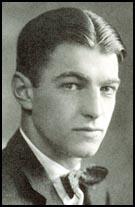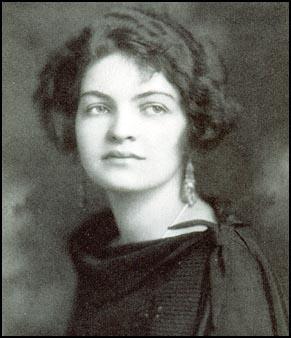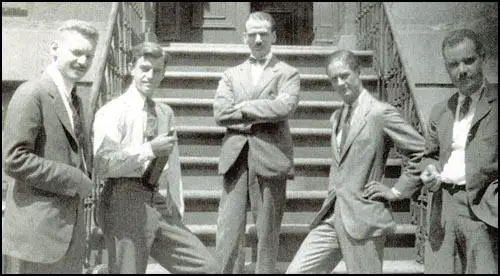John Stuart Martin

John Stuart Martin was born in 1901. A talented sportsman, he lost his left arm in a childhood duck-hunting accident. Martin attended Princeton University where he edited the Daily Princetonian.
In 1923 his cousin, Briton Hadden, and Henry Luce, established Time Magazine. Martin was appointed as a staff writer. Other colleagues at the magazine included Thomas J. C. Martyn, Roy Edward Larsen, Manfred Gottfried and Niven Busch. Martin specialized in writing humorous stories for the magazine.
George Teeple Eggleston, who worked for the company at the time, later wrote: "Although he had lost his left arm in a hunting accident, such was his prowess with his right that he continued to be a crack shot. He not only played par golf, but earned his letter in varsity soccer as well. He had performed brilliantly as managing editor of Time - it was understood that he was the only Timeman who could write any part of the magazine more skillfully than Luce."
Isaiah Wilner, the author of The Man Time Forgot (2006), has pointed out: "Martin was a sophisticated and romantic figure, as well as a self-destructive one.... Martin had a sharp gaze and a deep, mellifluous voice... Fiercely competitive, he remained the consummate sportsman, and a deadeye with a rifle. Years later, when a Peregrine falcon flew past his office window on the fifty-second floor of the Chrysler Building, he would grab his 20-gauge shotgun and kill the bird in midair, then retrieve it from the roof of a nearby tenement."
Martin married Mimi Bushnell after she found out she was pregnant. She was described as "five-foot eleven with deep red, curly hair and widely separated brown eyes... she had a ravishing and seductive presence and reminded men of the women in Titian's paintings." Martin had a reputation as a philander and Mimi later became very close to Briton Hadden.

Time Magazine moved to Cleveland in August, 1925. The advertising staff remained behind in New York City. Most of the journalists, researchers and office staff refused to relocate. This was partly because Luce refused to pay for their moving expenses. Instead, he sacked the entire staff but offered to reappoint them if they applied for jobs in Cleveland. Thomas J. C. Martyn was furious about the way he was treated and refused to move. Martin, however, was allowed to stay in New York.

John S. Martin, Thomas J. C. Martyn, Niven Busch and Briton Hadden
After the death of Briton Hadden Martin became managing editor of Time Magazine. In 1938 he began to get into strong arguments with Henry Luce. According to George Teeple Eggleston: "But at about the hour Martin's talent was most needed at Life he suddenly had a personality flip. He took to shouting down Luce at story conferences - calling Luce's ideas "buckeye" - bawling out Longwell before everyone at staff meetings, and becoming generally obnoxious all around. When it was discovered that he was drinking heavily, Luce sent him off on a year's sabbatical and brought Time's managing editor, John Billings, in to fill the Life job. Martin suffered no loss financially from the demotion; he had long since become a millionaire thanks to his Time, Inc. stock."
Martin retired from the magazine to devote more of his time to freelance writing. This included the books, The Home Owners Tree Book, General Manpower and Learning to Gun: A Plain-Spoken Manual for the Ardent but Unaccomplished.
John Stuart Martin died in Phillipsburg, New Jersey, on 25th June, 1977.
Primary Sources
(1) George Teeple Eggleston, Roosevelt, Churchill, and the World War II Opposition (1979)
Another painful matter confronting Luce was the problem of Life's managing editor. He had brought John S. Martin over from Time to handle the job, and just when the new publication was within weeks of going to press Martin showed every sign of having a nervous breakdown. John Martin, a cousin of the co-founder of Time Briton Hadden, had come to the magazine in 1922 directly upon graduation from Princeton, where he had edited the Daily Princetonian. Martin had also made a name for himself on campus as a phenomenal athlete. Although he had lost his left arm in a hunting accident, such was his prowess with his right that he continued to be a crack shot. He not only played par golf, but earned his letter in varsity soccer as well. He had performed brilliantly as managing editor of Time - it was understood that he was the only Timeman who could write any part of the magazine more skillfully than Luce. But at about the hour Martin's talent was most needed at Life he suddenly had a personality flip. He took to shouting down Luce at story conferences - calling Luce's ideas "buckeye" - bawling out Longwell before everyone at staff meetings, and becoming generally obnoxious all around. When it was discovered that he was drinking heavily, Luce sent him off on a year's sabbatical and brought Time's managing editor, John Billings, in to fill the Life job. Martin suffered no loss financially from the demotion; he had long since become a millionaire thanks to his Time, Inc. stock.
